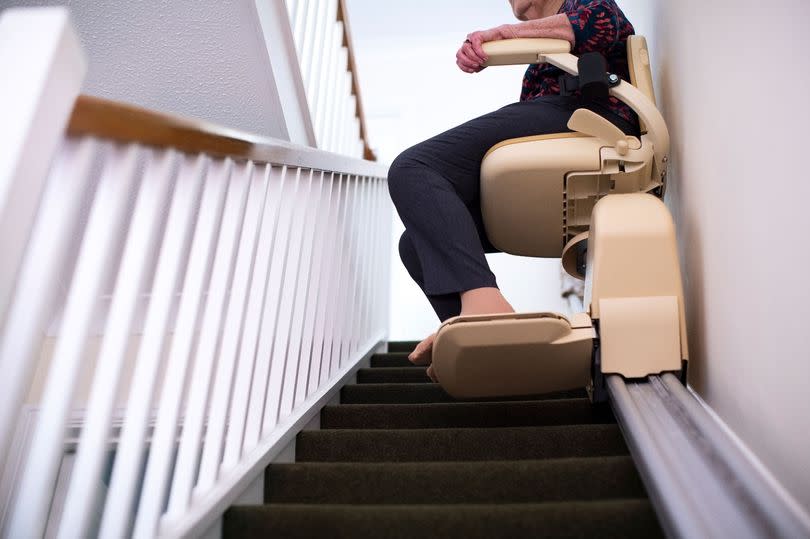Fears of 'sleepwalking into disaster' amid spiralling costs of home adaptations for disabled people

The system to adapt homes for people with disabilities is "sinking" with rising demands and costs, a council meeting has heard.
Councillors are looking into how to improve as it faces more applications and higher costs of works, with some residents in need having to find large sums of money for much-needed changes to their homes. One member warned they could be "sleepwalking into disaster" if they did not tackle the issue and plan ahead.
Disabled facilities grants (DFGs) contribute to the cost of "necessary and appropriate" home adaptations like ramps, rails, stairlifts, wet rooms, extensions and widened doors. The grants, funded through NHS and council budgets, allow people to live in their homes independently and prevent them going into hospital or care homes.
READ MORE: Petition launched to alter 'stealth tax' on traders gathers more than 100 signatures
READ MORE: Controversial homes plan narrowly approved despite warnings of 'creeping overdevelopment'
Stockton Council is now reviewing the grants. Housing, regeneration and investment manager Sam Dixon told councillors the maximum grant had stayed at £30,000 for more than 15 years: "It has been like that since 2008, and obviously things have moved on quite a lot."
She said their budget had risen but so had materials and labour costs: "Now we get £1.9m so it's a massive difference. But we're still struggling.
"Do we leave the limit at £30,000 or do we look at raising that? All that'll do is diminish money more.
"At the moment a standard extension's probably costing us about £50,000, so before you go anywhere, that person's got to find £20,000. We're seeing more and more extensions coming through.
'You can only do so much'
"We are trying to look at different ways of doing things. But you can only do so much.
"I currently have 181 people on the waiting list, and the person who's at the top of the list at the moment was referred through in June last year. Previously you'll be seen within two months. Now you can see it's a year."
She said once applications were approved the time was shorter: "At the moment we're not doing too bad, it's at 136 (days) but the previous year it was 150. If the waiting list keeps growing it's going to go over.
"At present it feels as though we're sinking a little bit. And genuinely the only thing that could help that is more money.
'It's getting worse rather than better'
"There's that much demand but we don't have enough funding to be able to fund all the DFGs. Potentially we've got about £700,000 already committed this year.
"That may mean... you'd have to say to everybody, 'I'm sorry, we can go on and approve them but we won't be getting around to you until at least April next year.'
"It's getting worse rather than better. In my opinion that's because the DFGs are working, it's enabling people to stay in their homes longer.
"But the risk is, if we carry on the way we are, more people are going to be admitted to hospital or care homes, which is then going to cost us more in the long run."
Costs 'trivial' compared to care homes
She suggested to the people select committee that they look at how to improve or support things as it starts a 10-month review of the grants. She said people struggled to get money together to make their contributions and were offered loans to help meet the costs.
Chris Donnison, building and heating, ventilation and electrical service manager, suggested a "more joined-up and collaborative approach" and seeking agreement to provide adaptations for social housing. He added: "I don't think money is purely the answer."
But he said the costs of adaptations seemed "trivial" compared to those of care homes. Occupational therapy team manager Krasen Saltikov said: "Approximately one hour of care and support a day converts into about £80,000 per year. We're talking about quite a significant number.
"Not having stairlifts, ramps... actually increases the risk of admission to long-term residential care, which costs a lot of money. I think we're actually losing money by not investing."
'Massive concern'
Cllr Eileen Johnson said: "The case we should be putting is not how much we're spending but how much we're saving. When your budget's coming to an end, what you've still got is this need, and those people (are told) 'sorry, we've spent all our money so you're going to have to wait for next year's budget' - that's wrong."
Ms Dixon said there was a "massive concern" with other housing providers not providing funding and relying on DFGs more, with many requests coming from tenants "desperately in need". She added: "It's already risen 10% within the year and they've taken up 40% of our budget. It's a massive chunk of our funding.
"They know we've got no legal right to refuse them. It's a bit frustrating. It'd be great if we could get some understanding from registered providers."
'It's getting a bit ridiculous'
Mr Donnison added: "In my opinion, it's getting a bit ridiculous when they're not willing to put a handrail or a grabrail up." Committee chair Cllr Marilyn Surtees said social housing providers had "eye-wateringly high reserves", asking: "Why aren't they taking on their responsibility for the welfare of their tenants?"
Mr Donnison replied: "That question was specifically asked, and they don't have that responsibility, basically."
Cllr Ian Dalgarno said: "We're all living longer, touch wood. Money's getting tighter so things are just going to get continually stretched, unless somebody does a bit of forward planning.
"It's got to be looked at. We're sleepwalking into disaster."

 Yahoo News
Yahoo News 
